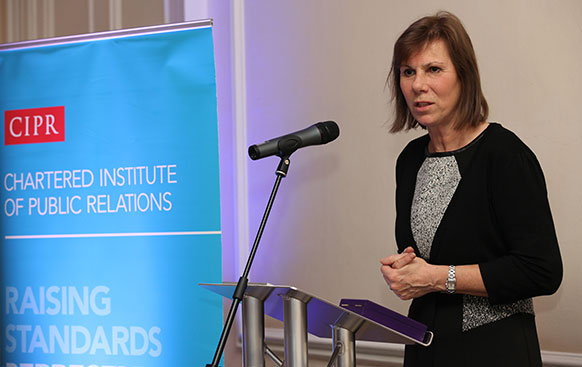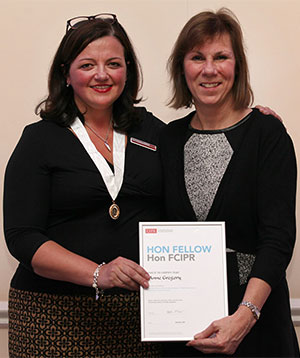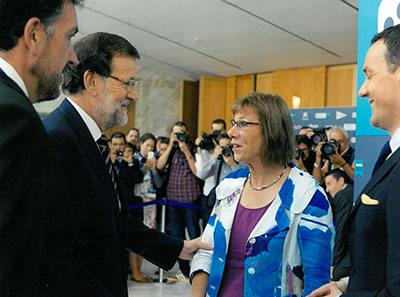Highest national award for Professor of Corporate Communications
 The University's Professor of Corporate Communications Anne Gregory is pictured speaking at the event in London where she received her Honorary Fellowship from the Chartered Institute of Public Relations (CIPR).
The University's Professor of Corporate Communications Anne Gregory is pictured speaking at the event in London where she received her Honorary Fellowship from the Chartered Institute of Public Relations (CIPR).
Mon, 09 Mar 2015 15:06:00 GMT
Chartered Institute of Public Relations confers Huddersfield professor Anne Gregory with the rare distinction of Honorary Fellow
 Professor Anne Gregory receives her Honorary Fellowship with the Chartered Institute of Public Relations (CIPR) from CIPR President Sarah Pinch.
Professor Anne Gregory receives her Honorary Fellowship with the Chartered Institute of Public Relations (CIPR) from CIPR President Sarah Pinch.
SKILLED strategic communications are vital in a world of increasing accountability and transparency, where there are few hiding places for the chiefs of private and public organisations. Over the past decade there has been an immense amount of research in the topic and a University of Huddersfield professor is co-editor of a new four-volume anthology that is now a “bible” for this burgeoning branch of public relations.
Anne Gregory is the University’s Professor of Corporate Communications, Strategy, Marketing and Economics. She collaborated with Professor Robert Heath, of the University of Houston, to produce Strategic Communications. The set of books – published as part of a series named Master Works – comes at a time when Professor Gregory has been recognised for her key role in developing the standing of her profession in the UK. She has just received an Honorary Fellowship from the Chartered Institute of Public Relations, and the distinction was conferred on the tenth anniversary of this body being awarded its Charter in 2005.
Professor Gregory was President of the Institute of Public Relations – as it then was – during 2004, when she instigated the demanding process of achieving chartered status, having campaigned for this because, she said, the public relations profession had come of age.
“The Institute was representative of practitioners and had an enforced code of ethics. There was a growing body of knowledge about PR, and there were professional and university courses – so all the hallmarks of a profession were in place.
“But we had to go through many hoops to get chartered status! We had to go back and forth between ourselves and the Privy Council before they were satisfied,” added Professor Gregory.
“Good communication and transparency are increasingly important”
 Pictured left: Professor Gregory meets the Spanish Prime Minister Mariano Rajoy Brey at an International Public Relations Conference.
Pictured left: Professor Gregory meets the Spanish Prime Minister Mariano Rajoy Brey at an International Public Relations Conference.
Her Honorary Fellowship of the CIPR was conferred at a meeting in London. Professor Gregory was already a holder of the Institute’s Sir Steven Tallents Medal – named after a founding father of the PR profession in the UK – and is one of only six people who have ever received both distinctions.
She became co-editor of the four-volume Strategic Communications – which is set to become a standard reference work – after an approach from the University of Houston’s Professor Robert Heath, who is a renowned authority in the field.
“Strategic Communications is about organisations using communications in a particular way to help it achieve its objectives,” said Professor Gregory. She added that this approach to public relations was relatively new, but over the past ten years it had accumulated a considerable body of published work, reflected in the 1,680-page book, which includes more than 80 key research articles from authors around the world.
There are several contributions from Professor Gregory’s own body of work, including her articles Communication Dimensions of the UK Foot and Mouth Crisis and Involving Stakeholders in Developing Corporate Brands.
Changes in technology combined with globalisation mean that good communication and transparency are increasingly important, said Professor Gregory. “Senior management within organisations find themselves constantly in the public gaze, and new technologies have made them more accessible, so they have become much more accountable,” she added. “There was a time when they could hide behind a gatekeeper – but they can’t now.”







